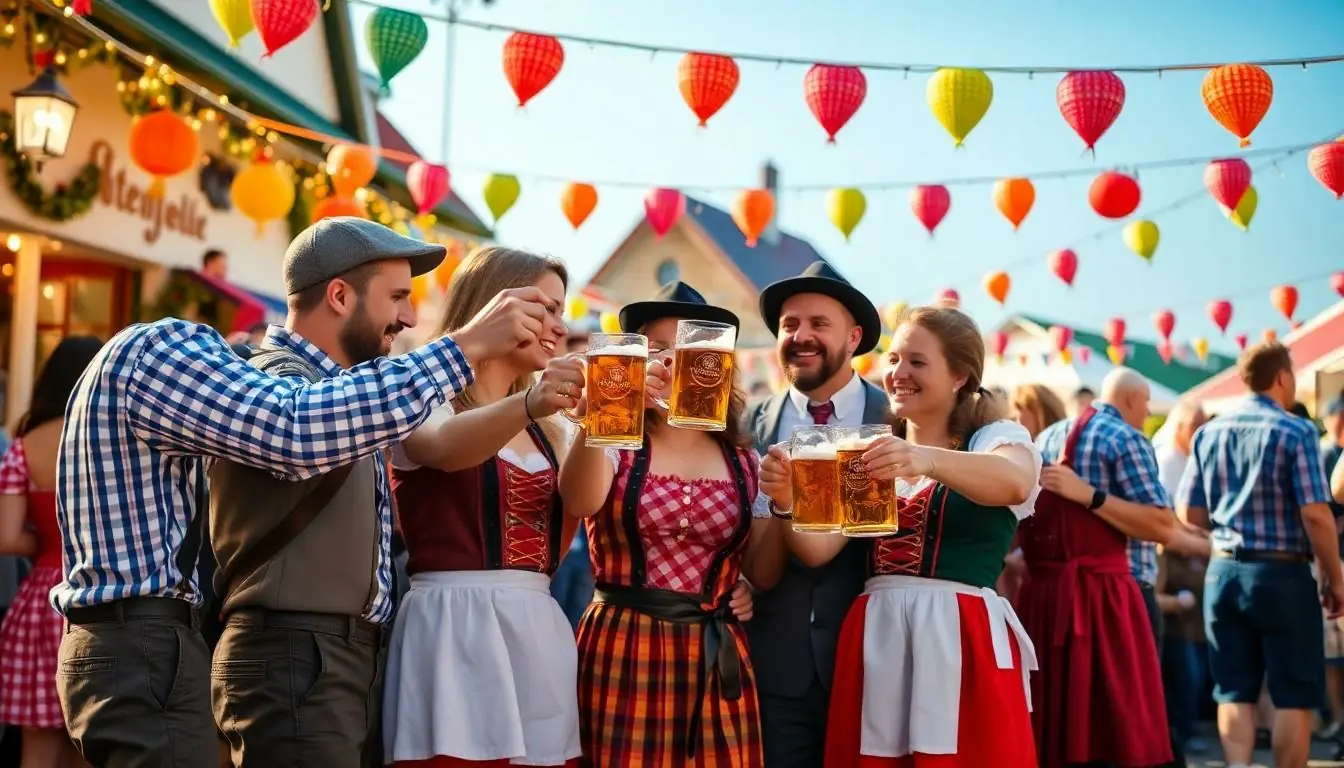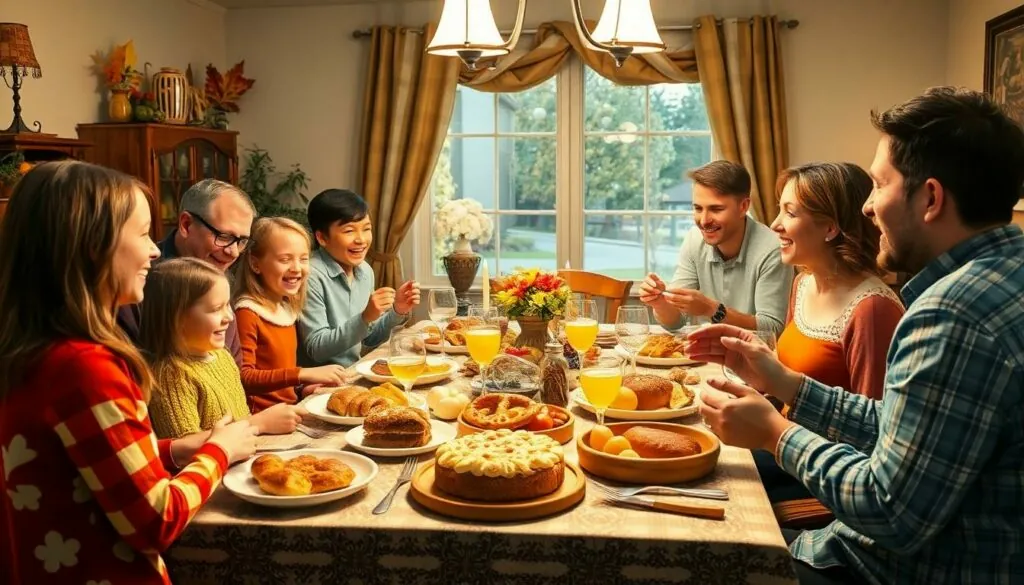Table of Contents
ToggleWhen it comes to family traditions, Germans really know how to throw a party—whether it’s a festive holiday gathering or a quirky Sunday ritual, there’s always something to celebrate. Picture this: a cozy living room filled with the sweet aroma of freshly baked pretzels, laughter echoing as everyone gathers around to share stories. It’s not just about the food; it’s about the bonds that strengthen over time.
German family traditions are rich in history and charm, blending humor with heartfelt moments. From the quirky ways they celebrate birthdays to their unique holiday customs, these traditions offer a glimpse into the heart of German culture. So grab a slice of Black Forest cake and get ready to explore the delightful tapestry of family life in Germany. You’ll find that these traditions not only keep families close but also make for some unforgettable memories.
Overview of German Family Traditions
German family traditions deeply reflect the country’s cultural values, emphasizing togetherness and celebration. Families often gather for significant events such as birthdays, weddings, and holidays, creating memorable moments. Food plays a central role in these gatherings, with staple dishes like sauerkraut, bratwurst, and festive treats like Stollen enhancing the experience.
Celebrating Christmas is particularly noteworthy, as families engage in Advent traditions leading up to the holiday. They decorate with lights and ornaments, creating a warm atmosphere. On Christmas Eve, many families exchange gifts, fostering a sense of joy and anticipation.
Another important tradition is Oktoberfest, where families come together to enjoy music, traditional clothing, and hearty meals. Children participate in activities like merry-go-rounds and games, reinforcing bonds among family members.
Fasching, the German carnival season, showcases more family involvement. Families attend parades and dress in costumes, embracing creativity and fun while celebrating together. This festive occasion promotes unity and laughter.
German family traditions also incorporate seasonal customs like celebrating harvest festivals in autumn. Families gather to give thanks, share bountiful meals, and partake in activities that highlight community spirit. Such practices deepen connections among family members and strengthen their roots.
Understanding these traditions reveals the joy, warmth, and connection inherent in German family life. Engaging in rituals ensures lasting bonds among family members, enriching the cultural tapestry of Germany.
Historical Background

German family traditions emerge from a rich historical context influenced by various cultural and regional factors. These traditions reflect the collective identity and values shared across generations.
Influence of Regional Differences
Regional variations shape family traditions in Germany. Southern Germany often showcases strong ties to celebratory events, while Northern regions emphasize maritime culture during festivities. You might notice that Bavarian families celebrate Oktoberfest with unique local customs, highlighting their specific heritage. In contrast, families in the East focus on harvest traditions, bringing communities together through seasonal fairs. Each region’s distinct practices contribute to a colorful mosaic of German family life, enriching collective experiences during special occasions.
Evolution Over Time
Family traditions in Germany evolve, blending historical customs with contemporary influences. Over the centuries, celebrations adapted to social changes and global interactions. The integration of international dishes into family gatherings illustrates this evolution. Birthdays now often include cakes from various cultures, while holiday meals showcase global culinary trends. Despite these adaptations, core values, such as togetherness and celebration, remain at the heart of German family traditions. This ability to embrace change while honoring the past strengthens family bonds across generations.
Key German Family Traditions
German family traditions embody warmth and connection through shared experiences and heartfelt moments. These customs create a rich tapestry of cultural expression, emphasizing togetherness during various occasions.
Celebrating Festivals and Holidays
Families take part in numerous festivals and holidays, which showcase German culture. Christmas stands out as a significant celebration, featuring Advent traditions and festive decorations. Families often exchange gifts on Christmas Eve, creating lasting memories. Oktoberfest draws families together to enjoy traditional music, hearty meals, and cultural attire. Children participate in activities that foster joy and community spirit. Additionally, Fasching, the vibrant carnival season, allows families to engage in fun parades and dress-up activities, promoting creativity and unity. Seasonal harvest festivals highlight the importance of agricultural roots, emphasizing shared meals and regional specialties.
Importance of Family Gatherings
Family gatherings play an essential role in strengthening bonds and fostering unity. Celebrations for birthdays, weddings, and anniversaries emphasize the significance of togetherness. Mealtimes serve as vital moments where families share stories and laughter, reinforcing connections. Traditional dishes, such as sauerkraut and bratwurst, highlight culinary heritage, enhancing the dining experience. These gatherings cultivate an environment of support and love, reminding family members of their collective identity. Importantly, such events create an opportunity for generations to connect, ensuring the continuity of traditions and shared values within families.
Traditional German Cuisine
Traditional German cuisine plays a vital role in family gatherings, with meals serving as a focal point for connection and celebration. Families often share recipes and culinary skills, reinforcing bonds through the act of cooking together.
Role of Food in Family Culture
Food embodies the spirit of togetherness in German family culture. Celebrations revolve around shared meals featuring iconic dishes like schnitzel, sauerkraut, and various bread types. Festivals such as Oktoberfest showcase communal dining experiences, where laughter accompanies hearty servings. Families gather around tables, savoring flavors that reflect rich cultural heritage. Each recipe carries stories passed through generations, cementing family ties and cultural identity. Ultimately, food acts as a unifying force, enhancing the warmth of family traditions.
Special Recipes Passed Down
Special recipes passed down through generations form a cornerstone of German family life. Classic dishes like Omas Apfelstrudel remain beloved treasures often prepared during family gatherings. Recipes survive decades, along with traditions that emphasize generational connections. Techniques taught by grandparents ensure that each family member knows how to recreate dishes like Rinderbraten or pretzels. Celebrating occasions with these time-honored meals nurtures a sense of belonging among family members. Each bite evokes nostalgia and strengthens ties through cherished culinary customs.
Cultural Practices and Customs
German family traditions encompass various cultural practices and customs that reinforce togetherness and celebration. Rituals manifest differently in everyday life, shaping family interactions and community engagements.
Rituals in Daily Life
Life in German households often includes daily rituals that foster connections. Families engage in shared meals, such as dinner together—a time for conversation about the day’s events. Regular outings to local parks or regional festivals also strengthen familial bonds. Weekly traditions might include game nights or movie nights, allowing families to unwind together. Seasonal festivities inspire special activities; for example, Advent calendars mark the days leading to Christmas, uniting families in anticipation. These rituals establish a rhythm, enhancing both daily life and family coherence.
Values and Beliefs
German family traditions revolve around core values and beliefs that reflect community and support. Respect for one another is paramount, guiding interactions among family members. There’s a strong emphasis on celebrating milestones, whether it’s birthdays or anniversaries, where loved ones gather to share memories. Additionally, traditions foster a sense of identity and heritage, connecting generations. Nostalgic food, such as traditional pastries or holiday dishes, embodies these values, often passed down through lineage. Embracing these customs solidifies relationships, promoting love and unity within families.
German family traditions embody a rich tapestry of connection and celebration. They nurture bonds through shared meals laughter and cherished rituals. Each gathering whether for a birthday or a seasonal festival reinforces the importance of togetherness and community spirit.
As families come together to enjoy traditional foods and engage in time-honored customs they create memories that last a lifetime. These practices not only reflect cultural values but also ensure the continuity of cherished legacies across generations.
In essence German family traditions serve as a vital reminder of the joy found in unity and the warmth that comes from celebrating life’s moments together.







